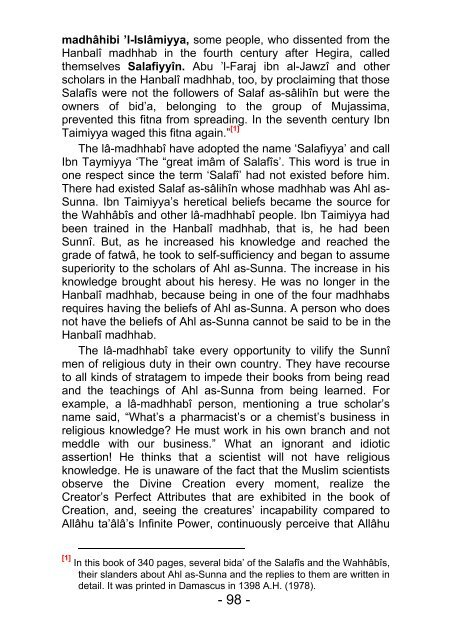8-Belief and Islam - Hakikat Kitabevi
8-Belief and Islam - Hakikat Kitabevi
8-Belief and Islam - Hakikat Kitabevi
Create successful ePaper yourself
Turn your PDF publications into a flip-book with our unique Google optimized e-Paper software.
madhâhibi ’l-Islâmiyya, some people, who dissented from the<br />
Hanbalî madhhab in the fourth century after Hegira, called<br />
themselves Salafiyyîn. Abu ’l-Faraj ibn al-Jawzî <strong>and</strong> other<br />
scholars in the Hanbalî madhhab, too, by proclaiming that those<br />
Salafîs were not the followers of Salaf as-sâlihîn but were the<br />
owners of bid’a, belonging to the group of Mujassima,<br />
prevented this fitna from spreading. In the seventh century Ibn<br />
Taimiyya waged this fitna again.” [1]<br />
The lâ-madhhabî have adopted the name ‘Salafiyya’ <strong>and</strong> call<br />
Ibn Taymiyya ‘The “great imâm of Salafîs’. This word is true in<br />
one respect since the term ‘Salafî’ had not existed before him.<br />
There had existed Salaf as-sâlihîn whose madhhab was Ahl as-<br />
Sunna. Ibn Taimiyya’s heretical beliefs became the source for<br />
the Wahhâbîs <strong>and</strong> other lâ-madhhabî people. Ibn Taimiyya had<br />
been trained in the Hanbalî madhhab, that is, he had been<br />
Sunnî. But, as he increased his knowledge <strong>and</strong> reached the<br />
grade of fatwâ, he took to self-sufficiency <strong>and</strong> began to assume<br />
superiority to the scholars of Ahl as-Sunna. The increase in his<br />
knowledge brought about his heresy. He was no longer in the<br />
Hanbalî madhhab, because being in one of the four madhhabs<br />
requires having the beliefs of Ahl as-Sunna. A person who does<br />
not have the beliefs of Ahl as-Sunna cannot be said to be in the<br />
Hanbalî madhhab.<br />
The lâ-madhhabî take every opportunity to vilify the Sunnî<br />
men of religious duty in their own country. They have recourse<br />
to all kinds of stratagem to impede their books from being read<br />
<strong>and</strong> the teachings of Ahl as-Sunna from being learned. For<br />
example, a lâ-madhhabî person, mentioning a true scholar’s<br />
name said, “What’s a pharmacist’s or a chemist’s business in<br />
religious knowledge? He must work in his own branch <strong>and</strong> not<br />
meddle with our business.” What an ignorant <strong>and</strong> idiotic<br />
assertion! He thinks that a scientist will not have religious<br />
knowledge. He is unaware of the fact that the Muslim scientists<br />
observe the Divine Creation every moment, realize the<br />
Creator’s Perfect Attributes that are exhibited in the book of<br />
Creation, <strong>and</strong>, seeing the creatures’ incapability compared to<br />
Allâhu ta’âlâ’s Infinite Power, continuously perceive that Allâhu<br />
[1] In this book of 340 pages, several bida’ of the Salafîs <strong>and</strong> the Wahhâbîs,<br />
their sl<strong>and</strong>ers about Ahl as-Sunna <strong>and</strong> the replies to them are written in<br />
detail. It was printed in Damascus in 1398 A.H. (1978).<br />
- 98 -











